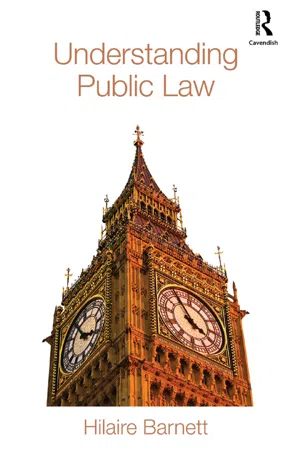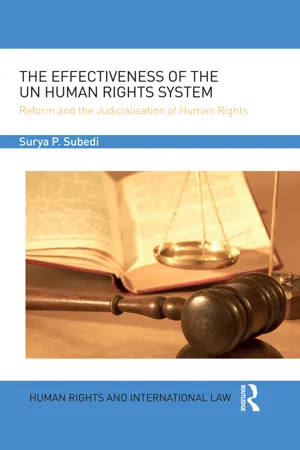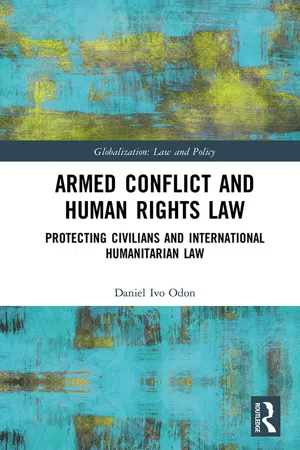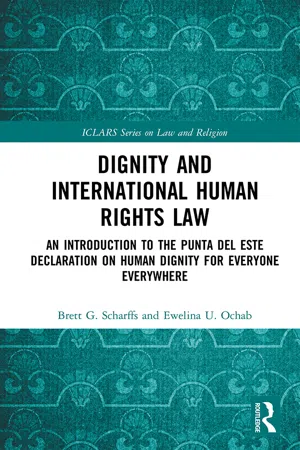Law
National Human Rights
National human rights refer to the fundamental rights and freedoms that are recognized and protected by the laws and institutions of a specific country. These rights encompass civil, political, economic, social, and cultural aspects, and are intended to ensure the dignity, equality, and well-being of all individuals within the nation's jurisdiction. National human rights laws are often aligned with international human rights standards and treaties.
Written by Perlego with AI-assistance
7 Key excerpts on "National Human Rights"
Learn about this page
Index pages curate the most relevant extracts from our library of academic textbooks. They’ve been created using an in-house natural language model (NLM), each adding context and meaning to key research topics.
- eBook - ePub
- Hilaire Barnett(Author)
- 2009(Publication Date)
- Routledge-Cavendish(Publisher)
The idea that individuals have rights that no government can violate has a long history, and is a key element in most written constitutions. In the United Kingdom, with its uncodified Constitution, the traditional approach to human rights has been rather different. Here, individuals are free to do whatever they please, provided that they do not contravene the law. Freedoms and rights exist but may be limited by what Parliament may enact. For example, in order to understand the scope (and limits) of the right to freedom of speech it is necessary to know that defamation (making wrongful and damaging falsehoods about another person) is actionable; that expression which threatens a breach of the peace or speech, which stirs up racial hatred, is a criminal offence. The ‘right’ is what remains once all the restrictions are considered.This conventional approach must now be seen in light of both the European Convention on Human Rights and the Human Rights Act 1998, which makes the majority of Convention rights enforceable in the domestic courts. Before looking at these in detail, a brief overview of the history of rights is required.The origins of rights
In Western societies Christian natural law has historically been highly influential. Natural law thought pre-dates Christianity and may be traced to the ancient Greek philosophers. Natural law theory in essence claims that there is a higher source of authority than the government. That higher source is – for Christian natural law theorists – God. For secular theorists, the higher source of authority is man’s rationality, which enables humans to understand what is morally required for the law of the State to be valid and to require the obedience of its citizens. In either case – religious or secular – natural law sets moral standards with which the law must comply. Failure to comply with this essential morality would make the law of the State invalid. Furthermore, according to some theorists, if the law of the State (the positive law) fails to match up to moral standards, citizens are not obliged to follow that law. An immoral law is no law and creates no obligation of obedience. This, in turn, leads to questions about the obligation to obey law and the ‘right’ to be civilly disobedient in order to raise awareness about a morally repugnant law.1 - eBook - ePub
The Effectiveness of the UN Human Rights System
Reform and the Judicialisation of Human Rights
- Surya Subedi, OBE, QC (Hon)(Authors)
- 2017(Publication Date)
- Routledge(Publisher)
In other words, human rights originate from recognition of that which a person is entitled to, and the commitment to not taking this away. From this perspective, human rights are seen as more of a set of ideals of a society and forming part of the basis of good governance. Human rights are not necessarily rights ‘given’ by States to their citizens. As stated by Justice Scalia, human rights ‘are not conferred by a beneficent State but predate the State and are to be protected by the State.’ 4 They are the rights that the State has agreed to uphold when a political settlement was reached concerning the political structure of a society, thereby enabling citizens to lead a life in peace. In other words, human rights are the result of a social contract and respecting human rights is honouring the contract made. Thus, statehood and its entailing mechanisms encompass the duty to protect human rights. Be it the British Bill of Rights (1689), the American Declaration of Rights (1774) and the Declaration of Independence (1776), 5 or the French Declaration of Rights of Man and of the Citizen (1789), human rights bills appear in their content to have been inspired by the writings of philosophers such as John Locke, Montesquieu, Rousseau, Milton, Voltaire, 6 and the very tradition of human rights in Western Europe seems likewise informed by Greek Philosophy, Roman law, Judaeo-Christian tradition, the Humanism of the Reformation and the Age of Reason or the Enlightenment. 7 2.4 The nature and category of human rights The concept of human rights is an evolving one. There is no consensus as to the definition of human rights. The definition varies from one society to another, and from secular societies to religious ones. What was not a human right in a given society yesterday has often become a right today and what is not a right today is likely to be a right tomorrow as the society advances - eBook - ePub
Armed Conflict and Human Rights Law
Protecting Civilians and International Humanitarian Law
- Daniel Ivo Odon(Author)
- 2021(Publication Date)
- Routledge(Publisher)
19Summing up, the law of human rights is deeply rooted in moral philosophy. Even after the Second World War, modern international law of human rights has been indissolubly linked with moral concerns.20 All conflicts addressed by human rights are also moral conflicts, and through the development of the modern international community, which accounts for plural subjects and sources of law dynamism, human dignity has served as a guide for human rights conflict resolutions appeasement. Both old and new human rights frameworks have had the same overall aim to construct a world that is more peaceful and humane, which would lead to the vanishing of war and all forms of human cruelty and barbarism.21The rise of human rights morality
As stated in Article 1 of UDHR, “all human beings are born free and equal in dignity and rights”. Since the birth of human rights in the American Declaration of Independence in 1776 and the French Declaration of the Rights of Man and Citizen of 1789 (where the correlated statement was “men are born and remain free and equal in rights”), the words equality in dignity and rights have been added. This subtle change encompasses a substantial reform of what we conceive as human rights and, most of all, who we perceive as human beings.A context of value is merged with human rights comprehension – considered human values acquired through the history of mankind – to comprise the juridical inventory of humanity . 22 Although the process of modernization might seem to bring a decline or erosion of values, in fact it has proven the opposite. Too many atrocities and cruelty were perpetrated during the building process of human rights. In general, human rights transgressions are diminishing, while human dignity is being emphatically advocated, which might be due to several reasons.23 However, one of the most important is that the notion of human dignity embraced by human rights encompasses human values related to religious and cultural traditions. These values are associated with a general duty to help people who are suffering, independent of who or where they are. Thinking around human dignity therefore emphasizes (i) the sacredness of human life, (ii) an ethos of love and (iii) universal respect.24 - eBook - ePub
Ethics for International Business
Decision-Making in a Global Political Economy
- John Kline(Author)
- 2010(Publication Date)
- Routledge(Publisher)
HUMAN RIGHTS CONCEPTS AND PRINCIPLESINTRODUCTION
A discussion of human rights provides both historical and contemporary contexts for examining ethical decision making on the international business issues presented in subsequent chapters. The concept of human rights attempts to set out global deontological standards that place priority value on the individual rather than on groups or institutions. In theory, these basic individual rights cannot be ethically overridden by teleological claims that outcomes in particular cases would yield better results, even for a majority of people. In practice, the specific enumeration of human rights principles, including potential conflicts between different rights, presents implementation difficulties for use as consensus guidelines. Despite this practical challenge, international policy debates increasingly appeal to human rights concepts and principles as the basis for nascent global conduct standards.INDIVIDUAL RIGHTS, STATE AUTHORITY AND HUMAN RIGHTS
The deontological notion of rights can encompass a broad scope of standards with a wide range of derivative authorities. History records recurring competition between different standards of rights promoted as the moral foundation for a given society. Religious authorities have pronounced specific standards for guiding behavior and administering justice according to principles revealed through divine inspiration. Royalty has claimed for itself a “divine right” of kings to decree standards of justice applicable throughout their realm. The rise of nation states essentially conferred authority on the national government to set a society’s civil standards. However, after the French and American revolutions, state power was often based on a constitution that, in theory if not always in practice, derived its authority from the consent of the governed and recognized certain individual rights that should not be infringed by state actions. - eBook - ePub
Dignity and International Human Rights Law
An Introduction to the Punta del Este Declaration on Human Dignity for Everyone Everywhere
- Brett Scharffs, Ewelina Ochab(Authors)
- 2021(Publication Date)
- Routledge(Publisher)
The UDHR and the key human rights covenants, for example, the ICCPR and the ICESR, focus predominately on the duties of states and state actors to protect human rights. Indeed, interNational Human Rights law, whether the UDHR (as part of the customary law) or the covenants (as international treaties), imposes duties that states are bound to respect. States assume human rights duties under international law when they voluntarily become parties to international treaties. On the other hand, customary international law imposes duties as arising from established international practices rather than voluntary acceptance of treaty obligations.50 UN Human Rights Council Resolution 6/37, Elimination of All Forms of Intolerance and of Discrimination Based on Religion or Belief, 14 December 2007, UN Doc A/HRC/RES/6/37. 18.51 “The world is divided into individual nation-states, and human rights protection is premised on each state being (primarily) responsible for protecting the human rights of all those within its territorial borders.” Sabine C. Carey, Mark Gibney, and Steven C. Poe, The Politics of Human Dignity: The Quest for Human Dignity (Cambridge University Press, 2010) 50.Apart from states having obligations to fulfill their human rights obligations, they may also have duties regarding human rights conditions in other states. The UN Charter calls upon member states to take “joint or separate action”52 - Padraic Kenna(Author)
- 2016(Publication Date)
- Routledge(Publisher)
6 Housing Rights in Constitutional Legislation A Conceptual Classification Michelle Oren, Rachelle Alterman and Yaffa Zilbershats DOI: 10.4324/9781315573830-6Introduction
Housing rights are conditions granted by statutes, or entitlements by law, that rest on the understanding of a need for housing. They imply certain duties and obligations either taken by the state or other entities and individuals.1 Much has been written about housing rights in the interNational Human Rights context.2 However, little comparative work has been published at the national level, particularly in relation to any classification or categorization of the status of housing rights in national constitutions.31 Peter King, ‘Housing as a Freedom Right’ (2003) 18(5) Housing Studies 661.2 Scott Leckie, From Human Needs to Housing Rights: An Analysis of the Right to Adequate Housing Under InterNational Human Rights Law (London, International Institute for Environment and Development 1992); Scott Leckie, ‘The Justiciability of Housing Rights’ in Fons Coomans and Fried van Hoof (eds.), The Right to Complain about Economic, Social and Cultural Rights: Proceedings of the Expert Meeting on the Adoption of an Optional Protocol to the International Covenant on Economic, Social and Cultural Rights (Utrecht, 25–28 January 1995) 24–30; Scott Leckie, ‘The Human Right to Adequate Housing’ in A Eide, C Krause, A Rosas and M Scheinin (eds.), Economic, Social and Cultural Rights: A Textbook (2nd edn, The Hague, Martinus Nijhoff Publishers 2000); Centre on Housing Rights and Evictions (COHRE), Legal Resources for Housing Rights: International and National Standards (Geneva, COHRE 2003); Padraic Kenna, ‘International Instruments on Housing Rights’ (2010) 2(1) Journal of Legal Affairs and Dispute Resolution in Engineering and Construction 11–20; Padraic Kenna, Housing Law, Rights and Policy- eBook - ePub
- Jane Lynch, Senthill Nachimuthu(Authors)
- 2018(Publication Date)
- CRC Press(Publisher)
CHPATER 10Human rights
The European Convention on Human Rights (ECHR) was incorporated into English law with the Human Rights Act 1998.1 The Act did not open the floodgates to a myriad of claims as had been anticipated and so there is very little case law on the subject as it relates to health or anything else. Although the Act is divided into sections, it is customary to refer to the Articles of the ECHR when discussing it.In brief the Human Rights Act gives individuals rights within society. There is a duty on government to enforce and protect those rights. The ECHR states that an organisation of the state (like the NHS) owes patients and clients a responsibility to maintain and uphold human rights.Health professionals also have a duty to uphold patients’ human rights, but if they fail to do so they will be accountable to their professional body and could face disciplinary action by the employer.Private hospitals are not organisations of the state, so technically they are not bound by the Act. However, they are providing a public service and will therefore be caught by the Act. Health professionals working in the private health sector will be expected to have regard to the Act under their contractual obligations.The Human Rights Act is not designed to facilitate access to healthcare or medical information. Its purpose is to protect the individual against state action. However, health professionals must always have regard to the Human Rights Act when treating and caring for patients.






